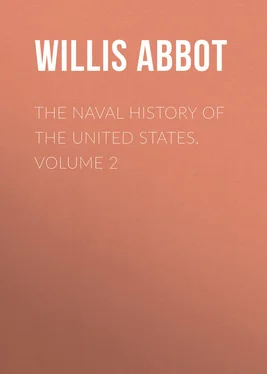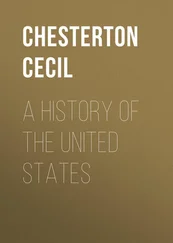Willis Abbot - The Naval History of the United States. Volume 2
Здесь есть возможность читать онлайн «Willis Abbot - The Naval History of the United States. Volume 2» — ознакомительный отрывок электронной книги совершенно бесплатно, а после прочтения отрывка купить полную версию. В некоторых случаях можно слушать аудио, скачать через торрент в формате fb2 и присутствует краткое содержание. Жанр: foreign_antique, foreign_prose, Историческая проза, на английском языке. Описание произведения, (предисловие) а так же отзывы посетителей доступны на портале библиотеки ЛибКат.
- Название:The Naval History of the United States. Volume 2
- Автор:
- Жанр:
- Год:неизвестен
- ISBN:нет данных
- Рейтинг книги:5 / 5. Голосов: 1
-
Избранное:Добавить в избранное
- Отзывы:
-
Ваша оценка:
- 100
- 1
- 2
- 3
- 4
- 5
The Naval History of the United States. Volume 2: краткое содержание, описание и аннотация
Предлагаем к чтению аннотацию, описание, краткое содержание или предисловие (зависит от того, что написал сам автор книги «The Naval History of the United States. Volume 2»). Если вы не нашли необходимую информацию о книге — напишите в комментариях, мы постараемся отыскать её.
The Naval History of the United States. Volume 2 — читать онлайн ознакомительный отрывок
Ниже представлен текст книги, разбитый по страницам. Система сохранения места последней прочитанной страницы, позволяет с удобством читать онлайн бесплатно книгу «The Naval History of the United States. Volume 2», без необходимости каждый раз заново искать на чём Вы остановились. Поставьте закладку, и сможете в любой момент перейти на страницу, на которой закончили чтение.
Интервал:
Закладка:
Night fell, but brought no cessation of the bombardment. But the enemy, while never slackening his fire, had determined to take advantage of the darkness to send out a landing party to take two small batteries on the banks of the Patapsco, and then assault Fort McHenry from the rear. Twelve hundred and fifty men, with scaling-ladders and fascines, left the fleet in barges, and moved up the Patapsco towards Fort Covington and the City Battery. But their plan, though well laid, was defeated by the vigilance and courage of the garrisons of the two threatened positions, – sailors all, and many of them men from Barney's flotilla, a training-school which seems to have given to the region about Chesapeake Bay its most gallant defenders. Just as the storming party turned the prows of the barges towards the shore, they were discovered; and from McHenry, Covington, and the City Battery burst a thunderous artillery-fire, that shook the houses in Baltimore, and illumined the dark shores of the river with a lurid glare. Bold as the British sailors were, they could advance no farther under so terrible a fire. Two of the barges were shot to pieces, leaving their crews struggling in the water. A ceaseless hail of grape and canister spread death and wounds broadcast among the enemy; and, after wavering a moment, they turned and fled to their ships. Cochrane, seeing his plan for taking the American positions by assault thus frustrated, redoubled the fury of his fire; hoping that, when daybreak made visible the distant shore, nothing but a heap of ruins should mark the spot where Fort McHenry stood the night before.
A night bombardment is at once a beautiful and a terrible spectacle. The ceaseless flashing of the great guns, lighting up with a lurid glare the dense clouds of smoke that hang over the scene of battle; the roar of the artillery; the shriek of the shell as it leaves the cannon's mouth, slowly dying into a murmur and a dull explosion, as, with a flash of fire, the missile explodes far away, – combine to form a picture, that, despite the horrors of wounds and death, rouses the enthusiasm and admiration of the beholder. When viewed from the deck of one of an attacking fleet, the scene is even more impressive. At each discharge of the great guns, the vessel reels and trembles like a huge animal in agony. The surging waters alongside reflect in their black depths the flash of the cannon and the fiery trail of the flying shell. Far in the distance can be seen the flashes of the enemy's guns, each of which may mean the despatch of a missile bringing death and pain in its track. One who has witnessed such a spectacle can readily understand the fascination which men find in the great game of war.
Pacing the deck of the one of the British vessels was a young American, whose temperament was such that he could fully appreciate all the beauties of the scene, even though harassed by anxious fears lest the British should be successful. This man was Francis S. Key, who had visited the fleet with a flag of truce, but was unable to get away before the bombardment began. When the sun set on the evening of the 13th, Key saw his country's flag waving proudly over the ramparts at which the British guns had been so furiously pounding. Would that flag still be there when the sun should rise again? That was the question which Key asked himself as he anxiously walked the deck throughout the night, striving to pierce the darkness, and make out, by the lurid lightnings of the cannon, whether the flag was still there. As the night wore on, Key took an old letter from his pocket, and on the blank sheet jotted down the lines of the immortal national song, "The Star Spangled Banner." Its words merely voice the writer's thoughts; for often during that night he looked anxiously shorewards, to see if
"the rockets' red glare, the bombs bursting in air,
Gave proof, through the night, that our flag was still there."
When the anxiously awaited daylight came, Fort McHenry still stood; and over it waved defiantly the starry folds of the United States flag. The British saw that, by land and sea, their attack had failed; and early in the morning the fleet, after taking on board the remnant of the land forces, sailed suddenly away, and left Baltimore safe. They had bombarded Fort McHenry for twenty-five hours, throwing nearly two thousand shells. Yet, wonderful as it may appear, only four of the Americans were killed, and twenty-four wounded. With this failure the British ended their chief offensive operations along the shores of the Chesapeake. The greater part of the fleet and the soldiery then moved southward, to take part in the operations along the Gulf coast, that culminated in the disastrous defeat of the invaders at New Orleans.
CHAPTER XVI
The naval incidents of the latter part of 1814 conferred little honor upon either of the belligerents. Seldom did the meetings between hostile ships rise to the dignity of battles. One or two small American brigs fell a prey to British frigates; but in every instance the disparity of force was so great that the weaker surrendered without striking a blow. Such was the case with the sixteen-gun brig "Rattlesnake," which escaped from one British frigate by throwing overboard all her guns, only to immediately fall a prey to the "Leander." In July of the same year, the United States brig "Siren" was captured by the British frigate "Medway," off the coast of Africa, after a long chase, during which the American hove overboard every thing movable on the brig. Not all these petty encounters ended so favorably for the enemy. Off New York a cutting-out party of volunteers surprised and captured the British tender "Eagle," a small craft carrying one thirty-two-pound howitzer, and fourteen men. Ten days later, the frigate "Tenedos," which had done such good service on the blockade, suffered the loss of her tender, which was gallantly carried away by the crew of a Yankee gunboat. Some very desperate combats between American privateers and British naval vessels were fought about this time, and will be duly noted in detail in the chapter treating of the exploits of the private armed navy.
As the autumn came on, the British naval forces began to rendezvous in the Gulf of Mexico, preparatory to the campaign before New Orleans. On Sept. 14, a squadron of four British sloops-of-war appeared off Mobile, and opened fire upon Fort Bowyer, which guarded the entrance to Mobile Bay. The attack was vigorous, and the defence determined. A British land expedition moved upon the fort from the landward side; and the little garrison found itself surrounded by enemies, many of whom were Indians, whose savage assistance the British had accepted from the very opening of the war. A small force, only, defended the fort. Percy, the British admiral, knew the weakness of the garrison; and, thinking of the ninety-two guns he could bring to bear against the twenty worked by the Americans, announced proudly, that he would give the garrison just twenty minutes to surrender. The twenty minutes passed quickly, and still the fort responded savagely to the fire of its assailants. The flag of the British ship "Hermes" was shot away; and soon after, a round shot cut her cable, and she drifted upon a sand-bank, and lay helpless, and exposed to a raking fire. Her captain, having set her afire, abandoned her; and she soon blew up. The other vessels kept up the attack gallantly for a time. The flagstaff of the fort was shot away; but the flag soon re-appeared, waving from a sponge-staff. The Americans then redoubled their fire, which soon told so severely upon the British ships that they were forced to withdraw. In the mean time, the assault of the Indians and troops had been checked, and the forces driven back in disorder, thus leaving the victory to the Americans.
Читать дальшеИнтервал:
Закладка:
Похожие книги на «The Naval History of the United States. Volume 2»
Представляем Вашему вниманию похожие книги на «The Naval History of the United States. Volume 2» списком для выбора. Мы отобрали схожую по названию и смыслу литературу в надежде предоставить читателям больше вариантов отыскать новые, интересные, ещё непрочитанные произведения.
Обсуждение, отзывы о книге «The Naval History of the United States. Volume 2» и просто собственные мнения читателей. Оставьте ваши комментарии, напишите, что Вы думаете о произведении, его смысле или главных героях. Укажите что конкретно понравилось, а что нет, и почему Вы так считаете.











![Hubert Bancroft - The Native Races [of the Pacific states], Volume 5, Primitive History](/books/749157/hubert-bancroft-the-native-races-of-the-pacific-s-thumb.webp)
![Hubert Bancroft - The Native Races [of the Pacific states], Volume 1, Wild Tribes](/books/750126/hubert-bancroft-the-native-races-of-the-pacific-s-thumb.webp)